
- •Unit 1. What is psychology?
- •Learning to read
- •Task 6. [individually, then in pairs]
- •I nteracting with the text
- •Task 1. [individually, then in groups of 3-4]
- •Утверждать
- •Область / сфера
- •Branch discipline subdiscipline subfield sub-domain
- •Task 1. [a) individually; (b) in class]
- •Writing
- •Simple Definitions
- •Task 1. [individually]
- •Task 2. [individually]
- •Structure and vocabulary aid
Task 1. [individually, then in groups of 3-4]
F ollow
the instructions above and survey the article ‘What is psychology?’
Discuss the results of your surveying in the group. Choose one person
to report the final ideas to the class.
ollow
the instructions above and survey the article ‘What is psychology?’
Discuss the results of your surveying in the group. Choose one person
to report the final ideas to the class.
Exploring the Text: In-depth reading
This is the most essential of all reading skills. It involves reading a text thoroughly in order to comprehend the ideas and arguments it contains. This implies a careful decoding of the writer’s text, usually with the aim of understanding not only the literal meaning of the text, but also the writer’s deeper purpose, his position, and other possible textual subtleties. |
Task 2. [individually]
Read the text to answer the questions below. Pay attention to the margin questions and hints on the right as you read. The margin questions and hints will help you to implement the reading strategies you have studied in the section LEARNING TO READ. Look up only those words in a dictionary which you feel you should understand precisely to be able to answer the questions.
Why is it so difficult to define psychology?
What are the approaches to generating a definition of psychology? What shortcomings do they have?
Complete the chart:
Approaches to defining psychology |
their shortcomings |
1. |
|
2. a dictionary approach |
|
3. a literal approach |
|
4. |
|
5. |
|
W
 hat
approach does the author choose to define psychology? What is his
definition?
hat
approach does the author choose to define psychology? What is his
definition?
E
5 |
Demystifying Psychology
In this regular feature examiners and teachers will explore baffling1 or taken-for-granted concepts and topics to give you clarity and insight into their meaning and their significance
What is psychology?
|
|
10
15
20
25
30
35
40
45
50
55
60
65
70
75
80
85
90
95
100
105
110
115
120
125
130
135
140
145
|
From the person on the street to the professor of anthropology, everybody thinks they know what psychology is and yet within the discipline itself there is an almost complete lack of consensus2. In this article we examine what some of the key problems in generating an acceptable definition are, and to what extent they can be overcome. The first psychology book I ever read was a Penguin paperback3 written by an American psychologist, George Miller, entitled Psychology - The Science of Mental Life. We will return to the significance of the title4 shortly. Miller begins his book in the following way: Several years ago a professor who teaches psychology at a large university had to ask his assistant, a young man of great intelligence but little experience, to take over5 the introductory psychology course for a short time. The assistant was challenged by the opportunity and planned an ambitious series of lectures. But he made a mistake. He decided to open with a short definition of his subject6. When the professor got back to his classroom two weeks later he found his conscientious assistant still struggling to define psychology. Let us speculate7 on some of the approaches the conscientious assistant may have taken and why they proved so problematic.
Everybody knows what psychology is. Don’t they? Miller8 follows his opening paragraph9 by writing 'An alternative approach [to the one taken by the conscientious assistant] is to assume at the very outset that everybody knows, more or less, what psychology is all about.' He then offers the classic definition given by the first great American psychologist William James way back in 1890 when the subject10 had only been established as a laboratory-based discipline for a mere 11 years: 'Psychology is the science of mental life.' (Hence my reference11 to the importance of the title of Miller's book, above.) In my view, there are three key shortcomings12 to the approach: • Notwithstanding the eminence of Professor Miller, it seems something of a cheat to 'dodge'13 the issue of at least endeavouring to construct a definition. • Just the most cursory inspection of the things psychologists write to each other (for example in the British Psychology Society periodical The Psychologist) shows that psychologists – especially those from different branches of the discipline such as biological, social, cognitive14 – tend to have very different views on what psychology is (or should be!) about. • The specific definition given – from William James – was rendered almost wholly redundant15 by the behavioural revolution (Watson 1913), which16 in turn was overturned by the cognitive revolution in the late 1950s. The point is that all definitions have a finite shelf life17. As with everything else, times change and psychology moves with them. Let's try another approach.
Let’s consult the dictionary OK, you could just get out your English dictionary and look up psychology there. But we like you to use psychology-specific books for your psychology. (Sorry if that's blatantly18 obvious.) I can hear you saying, 'Ah but what if we use a psychology dictionary.' Significantly better, but remember that the writers of these books have to work to very strict word limits and must inevitably produce definitions which are 'safe' and have to skirt around19 a lot of the controversy. And the next20?
A literal approach A rather extreme version of the previous approach is to examine the roots of the word and take that21 as its meaning. The word psychology has Greek components (although it was never used during the Ancient Greek period). A literal interpretation would be psyche = mind; logos = study of. So, we're really back to James' definition22 and have moved no further forward.
A historical approach In his book The Beginnings of Modern Psychology, W. M. O'Neil (1968) tells us that the term psychology 'was created in the fifteenth century to refer to one aspect of the study of spiritual being. The whole study was called pneumatology23 and psychology was the part concerned with the human soul.' It was not until 1732 that it was first used in a secular24 (non-religious) way, by Christian von Wolff, 'to denote the... philosophical analysis and interpretation of mental phenomena' Although I would be the first to acknowledge that it is impossible to understand the psychologies of the present without a good understanding of the psychologies of the past, I feel we need much more than this25 to understand what psychology in 2001 is. Before we move on, however, let me mention an excellent new book on the history of psychology by Thorne and Henley (see 'References and further reading'). Do follow this up if you get the opportunity, it's a fascinating read.
Dodge the first principles and let’s get practical Notwithstanding what I said earlier about the problems of dodging definitions, this does carry some appeal. What many authors do is to argue that it is impossible to define psychology in a way that will keep everybody happy but that we can get past this by looking at the 'fields of psychology'. By using this approach26 we can examine what we might call the 'sub-domains' of psychology. I mentioned earlier that bio-psychologists, social psychologists and cognitive psychologists (for example) have very different perceptions about what this thing called psychology should be about. Psychology is certainly a very 'broad church'27 (to borrow a phrase from our Prime Minister). Can you just imagine how different the working day of a psychologist studying the neurology of the brain and its28 impact on behavioural patterns would be from a Freudian therapist! But both29 are psychologists. However, before we abandon our efforts to establish any definition of psychology at all, let's try one final approach. How about:
What is it that psychologists do? And what do they produce? Let me introduce two terms that you may not be familiar with, epistemology30 and ontology31. For our purposes here we can define epistemology as the way in which knowledge is generated within a particular discipline. In practical terms this will relate to the methodologies used, although this is underpinned by the assumptions which justify the use of those methods. So, for example, many psychologists have a preference for using the experimental method (often the laboratory experiment) because this enables us to manipulate variables, control and standardise the environments in which we do our work. It further enables us – if we have done everything properly – to identify cause and effect relationships between certain factors. Ontology, on the other hand, can be taken to refer to what it is we find out. To put it simply, it is the findings (knowledge) we generate by our epistemological activities. Psychologists generate an enormous amount of knowledge (ontology) through their work with a wide range of methodologies (epistemology). Let us then say that that is what psychology is. Not a reductionist32 couple of lines or a paragraph in a dictionary, but all of the things we do and all of the journals and books that result from this. Perhaps this is the only way to define psychology.
References and further reading Thorne, B. M. and Henley, T. B. (2001) Connections in the History and Systems of Psychology (2nd edn), Houghton Mifflin. Miller, B. A. (1966) Psychology: The Science of Mental Life, Penguin Books. O'Neil, W. M. (1968) The Beginnings of Modern Psychology, Penguin Books.
Paul Humphreys is Principal Examiner for a major examining board, a Senior Lecturer at University College Worcester and an Editor of psychology review |
What does it mean in this context?
|
(Humphreys, P. (2001) ‘What is psychology?’, Psychology Review, Vol. 8, No.1, pp.26-27)
building your vocabulary
DICTIONARY USE
You can make use of different dictionaries, which could be:
Dictionaries can be helpful but they are difficult to use well. The skills needed to use a dictionary well will depend on your purpose. Do you want to use your dictionary to help you to understand an oral (listening) or written (reading) text? Or do you want to use your dictionary to help you produce language (speaking and writing)? |
Understanding (listening & reading) If you want to use your dictionary for understanding spoken or written texts, you will mainly be interested in looking up the meanings of words. It is important to remember, though, that the dictionary can never know the exact context in which the word is being used, so you will have to use your knowledge of the language as well. You will need to:
|
Task 1. [in pairs]
You are reading an article about psychology and see the following sentence:
Psychology's scope shifts with the field's evolution.
You do not understand the words ‘scope’ and ‘shifts’. Follow the steps described above and find the suitable meaning of these words in the following extracts from a bilingual dictionary.
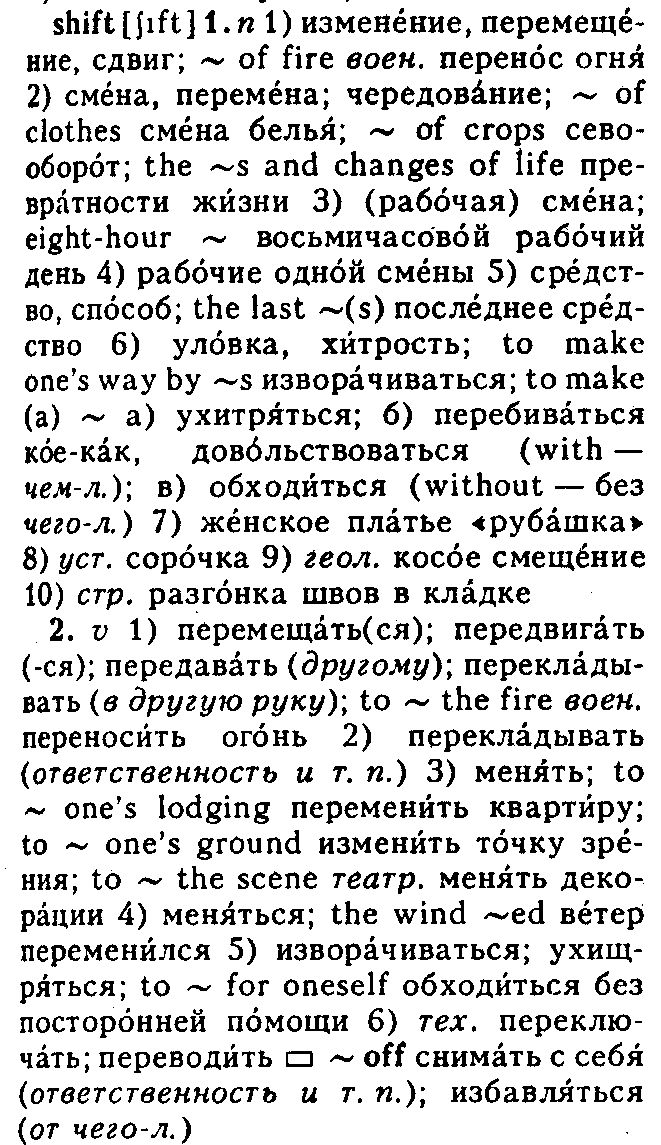
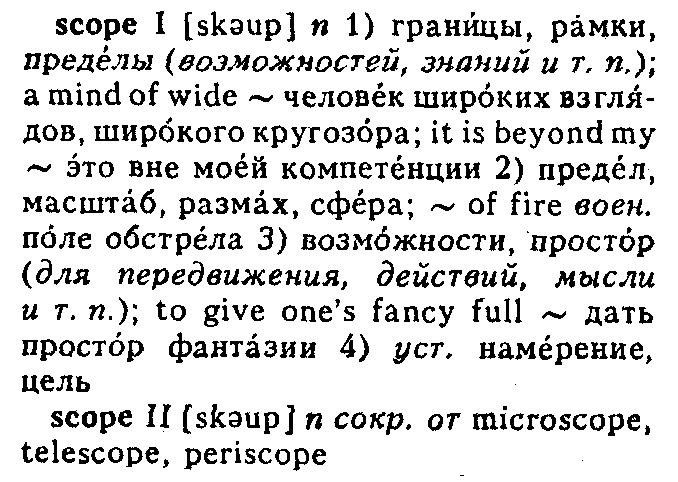
Task 2. [in pairs]
Look at the bilingual dictionary entry for ‘argue’. Identify the meaning of the word in the sentence below. Now have a look at the monolingual dictionary entry for ‘argue’. Does it give a more suitable meaning?
W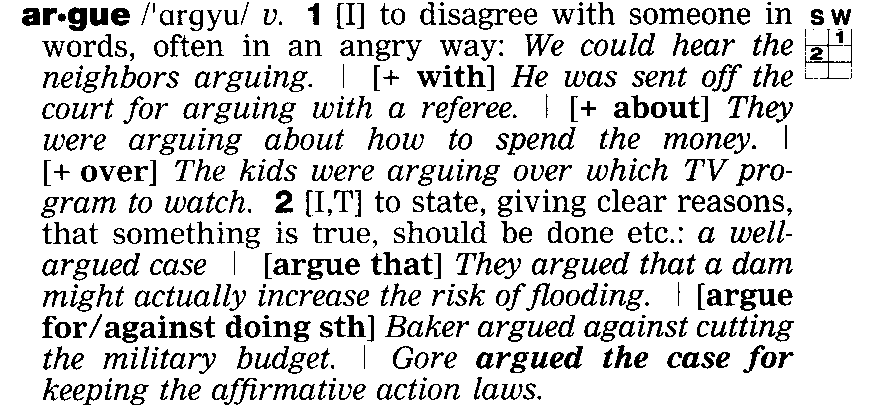 hat
many authors do is to argue
that it is impossible to define psychology in a way that will keep
everybody happy but that we can get past this by looking at the
'fields of psychology'.
hat
many authors do is to argue
that it is impossible to define psychology in a way that will keep
everybody happy but that we can get past this by looking at the
'fields of psychology'.

Production (speaking and writing) If you want to use your dictionary to help you produce spoken or written texts, you will need much more information. You may need: |
B.d. |
M.d. |
|
|
|
|
pronunciation |
- how to pronounce the word |
|
|
spelling |
- how to spell the word |
|
|
grammatical patterns |
- whether the word is a noun, verb, adjective etc and which patterns it occurs in |
|
|
collocations |
- which other words it typically occurs with |
|
|
frequency |
- how common the word is |
|
|
register |
- which type of language the word is used in, letters or reports, spoken or written biology or business etc? |
|
|
meaning |
- what the word means |
|
|
translation |
|
|
|
formation |
- how the word is made up e.g. what other words or affixes are part of the word, which other words is it related to |
|
|
connotations |
- what other meanings a word has, as well as its main meaning e.g. is it a positive or negative word? |
|
|
example sentences |
|
Task 3. [individually]
Compare the following dictionary entries. The first one is from a bilingual dictionary, the other comes from a monolingual dictionary. Tick the information they give in the chart above. Which dictionary gives more information about the word ‘study’?
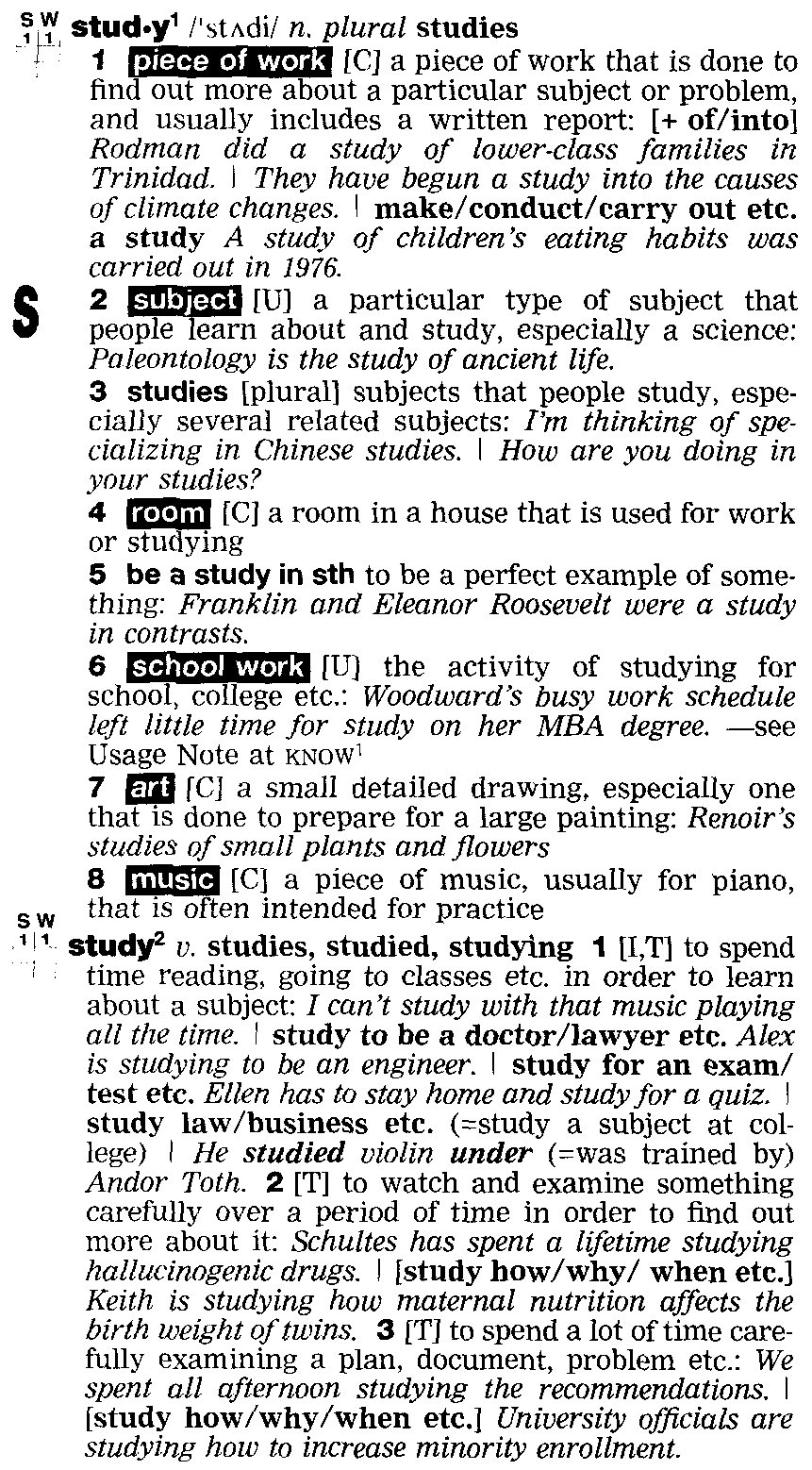
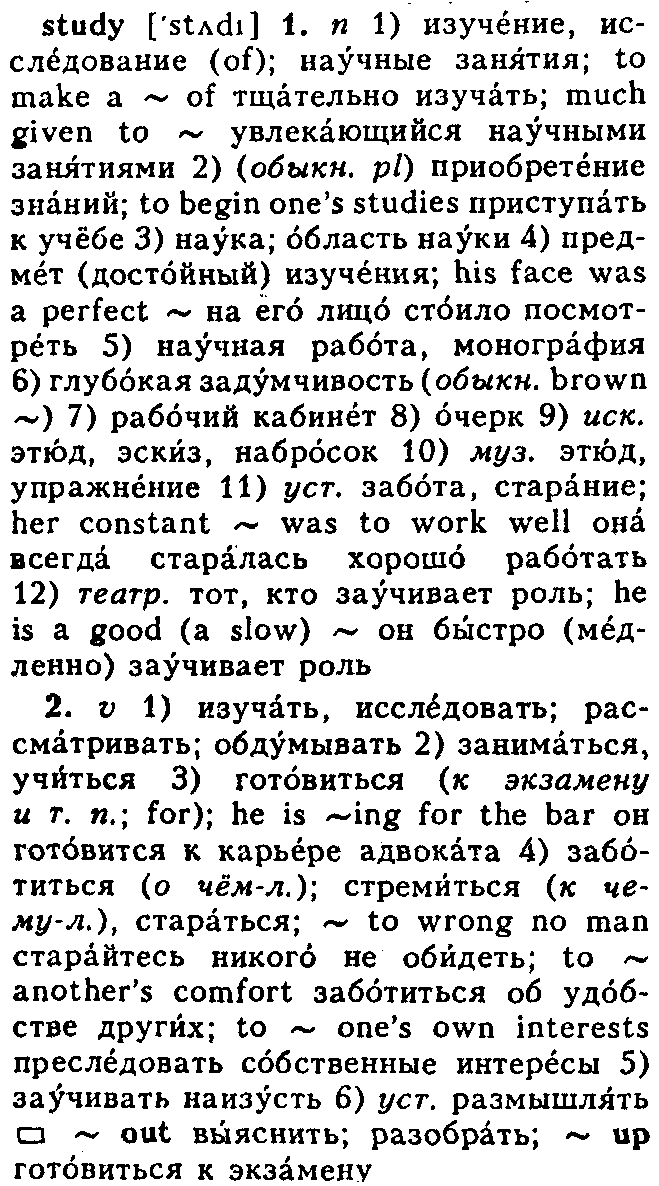
Some dictionaries are better than others. How good is yours? What information does it give about words?
![]()

Task 4. [(a) in pairs; (b) individually]
H
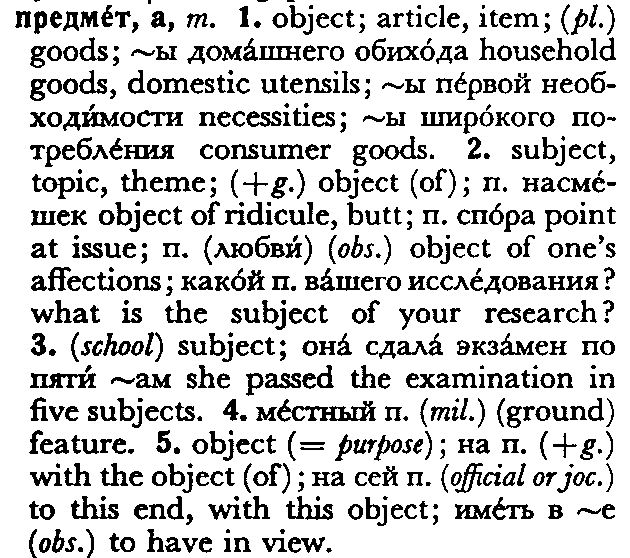 ow
would you say
‘определить
предмет
психологии’
in English? Look
at the
bilingual dictionary (Russian-English) entries below and choose the
suitable variants of translation. Explain your choice.
ow
would you say
‘определить
предмет
психологии’
in English? Look
at the
bilingual dictionary (Russian-English) entries below and choose the
suitable variants of translation. Explain your choice.
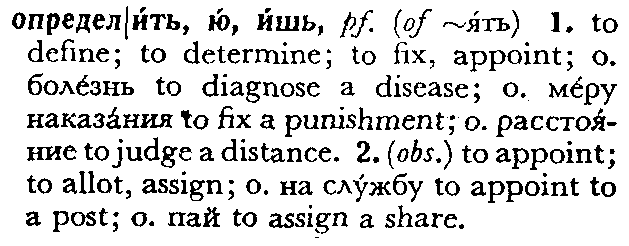

Sometimes a bilingual dictionary entry contains enough information for you to be able to identify the correct translation. But when this is not the case, you can try a double search:
|
Use a monolingual dictionary to check if you were right about the variants you have chosen in task 4 (a).
Task 5. [in pairs]
Discuss with a partner the advantages and disadvantages of a bilingual dictionary compared with a monolingual dictionary.
ACADEMIC VOCABULARY
Task 6. [individually]
Complete the ACADEMIC VOCABULARY chart with the translation and transcription of the words. The code in the first column of the chart denotes the source of the word (the letter stands for the passage or text the word is taken from, and the figure stands for the line the word occurs in). Remember to use definitions as well as the context to find the appropriate Russian equivalents. Circle those meanings in which the words are used in unit texts, where applicable.
|
word |
transcription |
definition |
translation |
noun |
||||
E 73 |
[+ to ] |
|
1. a method of doing sth or dealing with a problem |
|
|
|
2. movement nearer to sb/sth in distance or time |
|
|
D1 |
[+ of ] [in +] |
|
1. a particular part of a country, city etc. |
|
|
|
2. a particular subject or activity, or an aspect of it |
|
|
E 136 |
[+ of ]
|
|
a person, event or thing that makes sth happen |
|
E 4 |
[+ of ] |
|
an idea of how sth is, or how sth should be done |
|
E72 |
[+ over/ about / surrounding ] |
|
a serious argument or disagreement among many people over a plan, decision etc., over a long period of time |
|
C9, E9 |
[U] |
|
1. the practice of training people to obey rules and orders and punishing them if they do not; the controlled behaviour or situation that results from this training |
|
[C]
|
|
2. an area of knowledge; a subject that people study or are taught, especially in a university |
|
|
C14
|
[in / within +] [outside + ] [+ of] formal |
|
an area of knowledge or activity; especially one that sb is responsible for |
|
A(f) E21 |
[U] |
|
1. the knowledge and skill that you have gained through doing sth for a period of time |
|
|
[U] |
|
2. the process of gaining knowledge and skills |
|
|
[C] [+ of ] |
|
3. sth that happens to sb, or an event that sb is involved in |
|
|
[U] |
|
4. direct personal awareness of or contact with a particular thing |
|
|
[U] |
|
5. the sum total of the things that have happened to an individual and of his or her past thoughts and feelings |
|
|
[U] |
|
6. knowledge acquired through the senses rather than through abstract reasoning |
|
E107 |
|
|
1.an area of land in the country used for growing crops or keeping animals in, usually surrounded by a fence, etc |
|
|
|
2. a particular subject or activity that sb works in or is interested in |
|
|
E78, 91 |
|
|
the particular way in which sth is understood or explained |
|
E46 |
|
|
1. a problem or subject that people discuss |
|
|
|
2. one of a regular series of magazines or newspapers |
|
|
A (f) |
|
|
1. all the plants, animals and things that exist in the universe that are not made by people |
|
[C, U] [by + ] |
|
2. the usual way that a person or an animal behaves that is part of their character |
|
|
[C, U] [by + ] [+ of ] |
|
3. the basic qualities of a thing |
|
|
A (c), C6, E16 |
|
|
1. the study of the physical world and its manifestations, especially by using systematic observation and experiment (often used before a noun ) |
|
[U] |
|
2. the study of science |
|
|
[U,C] |
|
3. a particular branch of science |
|
|
[sing.] [+ of ] |
|
4. any systematically organized body of knowledge about a specific subject |
|
|
A (a) |
[C]
|
|
1. a piece of work that is done to find out more about a particular subject or problem, and usually includes a written report |
|
|
[U] |
|
2. a particular type of subject that people learn about and study, esp. a science |
|
|
studies [plural] |
|
3. subjects that people study, esp. several related subjects |
|
|
[U] |
|
4. the activity of studying for school, college etc |
|
adjectives |
||||
A (d)
|
|
|
of or connected with people rather than animals, machines or gods |
|
E11 |
|
|
very important and necessary for success or to understand sth |
|
E73 |
|
|
1. being the basic or usual meaning of a word or phrase |
|
|
|
2. that follows the original words exactly |
|
|
C13
|
|
|
1. very large or important |
|
|
|
2. related to sb's main subject of study in college |
|
|
verbs |
||||
E 105 |
[+ for / against sth] [that] |
|
1.to state, giving clear reasons, that sth is true, should be done etc. |
|
[I] [+ with] [+ about / over] |
|
2. to disagree with sb in words, often in an angry way |
|
|
E35 |
|
|
to think or accept that sth is true but without having proof of it |
|
D1, E 105 |
[+ sth as sth] |
|
1. to explain the exact meaning of a particular word or idea |
|
|
|
2. to describe or show sth accurately |
|
|
F62 |
[+ as sth] |
|
to start to exist; to appear or become known |
|
E39, 118 |
|
|
1. to start or create an organization, a system, etc. that is meant to last for a long time |
|
|
|
2. to start having a relationship, esp. a formal one, with another person, group or country |
|
|
|
|
3. to cause sth / sb to become generally accepted or recognized |
|
|
|
|
4. to discover facts that will prove that sth is true |
|
|
E 136 |
[+ sb/sth as sb/sth] |
|
1. to recognize sb/sth and be able to say who or what they are |
|
|
|
2. to find or discover sb/sth |
|
|
D6 |
|
|
1. to see or notice sb/sth |
|
|
|
|
2. to watch sb/sth carefully, especially to learn more about them |
|
|
formal |
|
3. to make a remark |
|
E85 |
referred, referring
refer to [T] PHRASAL VERB |
|
1. to mention or speak about sb/sth
|
|
[+ to ] |
|
2. to describe or be connected to sb/sth |
|
|
|
|
3. to look at sth or ask a person for information; CONSULT |
|
|
[+ sb/sth to sb/sth] |
|
4. to send sb/sth to sb/sth for help, advice or a decision |
|
|
C11 |
|
|
to formally write or say sth, especially in a careful and clear way |
|
A(h) |
underlay, underlain formal |
|
to be the basis or cause of sth
|
|
Word Families
Some words, like analysis, analyze and analytical share the same origin and belong to the same FAMILY: they all have the same ROOT (basic part of the word) and their meaning is related. Learning to recognize root words and understand the relationship between different members of a family is one of the best ways to improve your vocabulary and understanding of new words. If you know just one word in a family, you will be able to wok out the function and meaning of other members of that family. |
Task 7. [individually]
Complete the chart below with the corresponding parts of speech, using Russian equivalents as prompts. Analyze the suffix which is used to form each word and write it in the box on the right from the word.
noun |
noun-building suffix |
verb |
verb-building suffix |
adjective |
adjectivebuilding suffix |
|
– |
подходить approach |
– |
достижимый approachable |
-able |
|
|
вызывать |
|
причинный |
|
|
|
концептуализировать, осмыслять
|
|
понятийный, концептуальный |
|
|
|
– |
|
спорный |
|
|
|
испытывать |
|
опытный |
|
|
|
интерпретировать |
|
толковательный |
|
ученый |
|
– |
|
научный |
|
|
|
изучать |
|
– |
|
|
|
– |
|
human
|
|
аргументация
|
|
argue |
|
Спорный / доказательный
любящий поспорить
|
|
|
|
assume |
|
предполагаемый |
|
|
|
define |
|
определимый
|
|
учреждение
|
|
establish
|
|
установленный; принятый |
|
наблюдаемость
наблюдатель
|
|
observe |
|
видимый, поддающийся наблюдению |
|
|
|
refer
|
|
могущий быть приписанным
|
|
|
|
state |
|
– |
|
|
|
underlie |
|
лежащий в основе
|
|
Task 8. [individually]
Paraphrase the sentences, preserving their meaning. Sometimes it is necessary to add extra words. Replace the words in italics with their derivatives. The part of speech to be used is prompted in brackets at the end of each sentence. The first sentence has been done for you as an example.
What's the best way of approaching this problem? (n) What is the best approach
to this problem?
What is the cause of this controversy? (v)
Dreams are open to interpretation. (v)
It is generally assumed that stress is caused by too much work. (n)
What is the definition of psychology? (v)
What mental processes underlie physical and mental health? (adj)
This issue caused a lot of controversy. (adj)
Psychology is the science of human behaviours and mental processes. (adj)
Psychologists study the nature, functions, and phenomena of behaviour and mental
experience. (n)
This student likes arguing. (adj)
In her paper she presents some arguments concerning the fact that scientists do not
yet know enough about the nature of the disease. (v)
Behavior refers to any action or reaction that we can observe. (adj)
Task 9. [individually]
Study the derivatives of the word ‘human’. They have different meanings. Complete the diagram with appropriate Russian equivalents.
humankind (n) |
|
humanity (n) |
people in general |
|
1. people in general |
|
|
… |
|
2. the state of being a person rather than a god, an animal or a machine |
|
|
… |
|
|
3. (the) humanities the subjects of study that are concerned with the way people think and behave, for example literature, language, history and philosophy |
|
человечество |
|
… |
human |
Humane (adj) |
|
humanism (n) |
|
humanitarian (adj) |
showing kindness towards people and animals by making sure that they do not suffer more than is necessary |
|
a system of thought that considers that solving human problems with the help of reason is more important than religious beliefs. It emphasizes the fact that the basic nature of human beings is good |
|
concerned with reducing suffering and improving the conditions that people live in
|
… |
|
… |
|
… |
humanely (adv) |
|
humanist (n) |
|
humanitarian (n) |
… |
|
… |
|
… |
humanity (n) |
|
humanistic (adj) |
|
humanitarianism(n) |
… |
|
… |
|
… |
humanize (v) |
|
|
||
… |
|
|
Translate the following phrases into English choosing appropriate words from the diagram above.
человеческое поведение;
история человечества;
человеческая природа Христа;
гуманитарные науки;
гуманное общество;
поступить гуманно;
гуманность обращения с животными;
сделать тюремную систему более гуманной;
гуманистические идеи;
гуманитарная помощь;
г
 уманитарий.
уманитарий.
Collocation
Task 10. [in pairs]
Read through the information below. Try to find answers to the questions above. Are there any other reasons to study collocations except for those you already have in mind?
Collocation is the way words combine in a language to produce natural-sounding speech and writing. For example, in English you say strong wind but heavy rain. It would not be normal to say *heavy wind or *strong rain. And whilst you, being an intermediate learner, can recognize all four of these words, it takes a greater degree of competence with the language to combine them correctly in productive use. To a native-speaker these combinations are highly predictable; to you they are anything but.
Collocation runs through the whole of the English language. No piece of natural spoken or written English is totally free of collocation. For you, choosing the right collocation will make your speech and writing sound much more natural, more native-speaker-like, even when basic intelligibility does not seem to be at issue. If you say *strong rain, you may make yourself understood, but possibly not without provoking a smile or a correction, which may or may not matter.
But, perhaps even more importantly than this, language that is collocationally rich is also more precise. This is because most single words in the English language – especially the more common words - embrace a whole range of meanings, some quite distinct, and some that shade into each other by degrees. The precise meaning in any context is determined by that context: by the words that surround and combine with the core word - by collocation. A student who chooses the best collocation will express himself much more clearly and be able to convey not just a general meaning, but something quite precise. Compare, for example, the following two sentences:
This is a good book and contains a lot of interesting details. This is a fascinating book and contains a wealth of historical detail.
Both sentences are perfectly 'correct' in terms of grammar and vocabulary, but which communicates more (both about the book under discussion and the person discussing it)? |
Task 11. [individually]
All good dictionaries now include examples of common collocations but they do it in different ways: sometimes they are in bold print after the definition; sometimes in italics after the definition; and sometimes in the definition and examples. |
Examine the dictionary entry below. How are collocations introduced there?
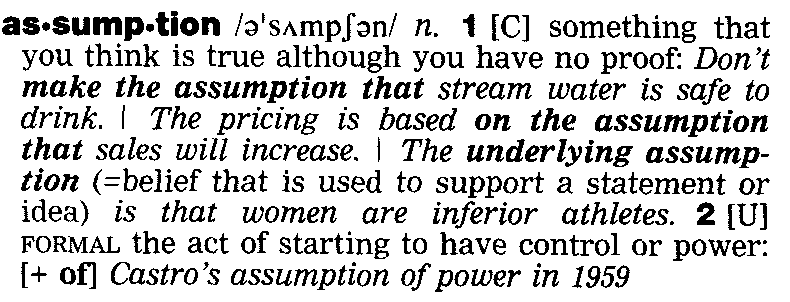
Still the power of normal dictionaries is limited when it comes to constructing texts, since they include only some collocations. So, if you need more collocation you should consult a collocations dictionary. |
Task 12. [individually]
(a) Study the entry from Oxford Collocations Dictionary for students of English.
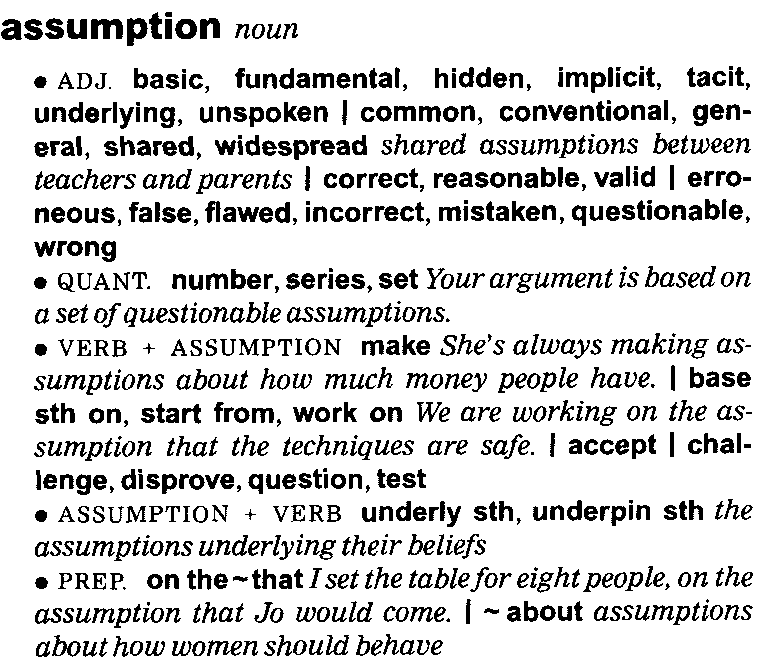
(b) Translate the following into English.
Сделать неверное предположение…
В основе этой теории лежат верные предположения.
Исходить из допущения, что …
Этот аргумент основывается на ряде общепринятых предположений.
Оспаривать основные допущения …
Task 13. [individually]
Match each noun with the group of adjectives it can collocate with.
concept controversy definition issue
continued / continuing / long-standing / prolonged |
|
|
big / burning / central /crucial / important / key / major / vital |
|
bitter / fierce / violent |
|
|
minor / side |
|
fresh / new |
|
|
basic / fundamental |
|
considerable / great / major |
… |
|
real |
… |
public |
|
|
contentious / controversial |
|
academic / scholarly |
|
|
difficult / thorny |
|
|
|
|
complex |
|
|
|
|
live / unresolved |
|
|
|
|
psychological |
|
central / core / essential fundamental / important / key |
|
|
|
|
basic / simple |
|
|
careful / clear |
|
broad / general / wider |
|
|
exact / precise |
|
entire / whole |
|
|
comprehensive |
|
clear / precise |
|
|
adequate / satisfactory/ acceptable |
|
ambiguous / vague |
|
|
broad / wide / loose |
|
complex / difficult |
… |
|
narrow / strict / rigid |
… |
abstract / theoretical |
|
|
official |
|
underlying |
|
|
conventional / standard |
|
useful |
|
|
alternative |
|
modern / new |
|
|
working |
|
old-fashioned / traditional |
|
|
dictionary |
|
scientific |
|
|
|
|
psychological |
|
|
|
|
Task 14. [individually]
Match each noun with the group of verbs it can collocate with.
concept controversy definition issue
…
|
… |
… |
… |
create / generate / produce / construct / give
include |
raise debate / discuss address / consider / deal with touch on settle avoid
arise underlie
|
cause / provoke / create
arise exist center on
|
define / formulate introduce develop |
Translate the following into English choosing appropriate adjectives from the previous task and suitable verbs from the table above.
Дать полное определение
Это определение включает в себя
Иметь размытое понятие о
Дать определение понятию
Ввести в оборот новое понятие
Спровоцировать жаркие дебаты
Избегать разногласий
По этому вопросу возникли
серьезные разногласия
Поднимать и обсуждать спорный
вопрос
Разрешить вопрос о ч-л
Мы только коснулись этого вопроса, однако, в следующий раз следует рассмотреть его более подробно
Обращаться к актуальной проблеме
В основе этих дебатов лежит важная проблема
Word Choice
Task 15. [individually]
Choose the correct verb in these sentences. Explain your choice.
Quizzes are used to define / identify/ establish how much material students have learned.
Psychology was defined / identified / established as a separate, formal field of study in 1879.
First of all we must define / identify / establish the problem areas.
Before psychology became defined / identified / established in science, it was popularly associated with extrasensory perception (ESP) and other paranormal phenomena.
Scientists have defined / identified / established a link between diet and cancer.
Another reason for the broad definition is that by the late 1920s, psychology was becoming too complex to be defined / identified / established in one sentence.
In 1913 John B. Watson defined / identified / established psychology entirely in behavioral terms.
The earliest explorers of human nature produced a number of 'armchair' theories which became defined / identified / established as a branch of philosophy.
Task 16. [in pairs]
Study the meanings of the words below. Note the difference between them.
